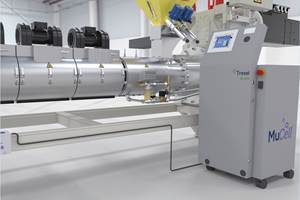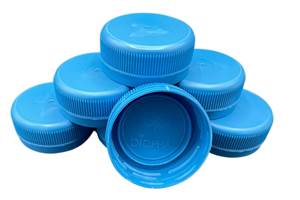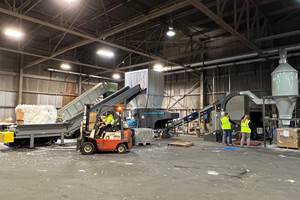Cash From Trash Goes Back to the Workers
Until last November, custom injection molder Hoffer Plastics Corp. in South Elgin, Ill., spent $1000 a month to have its plant waste dumped in a landfill.
Until last November, custom injection molder Hoffer Plastics Corp. in South Elgin, Ill., spent $1000 a month to have its plant waste dumped in a landfill. Much of it was plastics scrap from molding at the 372,000-sq-ft plant. “We sent about 150,000 lb of plastic to the landfill annually,” says Gretchen Hoffer Farb, director of supply-chain management. But a new in-house recycling initiative directed by Farb yielded quick and dramatic results. The company redirected 60,000 lb of material from the landfill in November, and reclaimed 30,000 lb the following month. “In December and January we did not send any plastic to a landfill,” says Farb. Instead of paying to have the material taken away, Hoffer is paid by a recycler for the materials. It expects to net more than $100,000 this year from its recycling efforts. “Considering rising material prices, making the most of the material that comes into the plant makes sense for business and the environment,” says Farb.
COMPLEX WASTE STREAM
The $50-million company, which is 55 years old this month, produces a wide range of products from a wide range of resins. Hoffer molds everything from caps and closures to large auto parts on 93 presses from 38 to 600 tons. Hoffer processed 18.5 million lb of resin last year, comprising 200 to 300 resin grades.
Processing scrap includes purgings, plastic webs, sprues, and runners. But that’s only part of the picture. Hoffer considers everything that comes into the plant to be a candidate for recycling. This includes packaging from workers’ lunches and drinks (aluminum cans, plastic bottles, paper, and cardboard), as well as office materials and the industrial packaging used to deliver raw goods, such as gaylord boxes, bags, and metal containers. “We are much more stringent on what leaves the plant as waste. We are recycling metals, paper, and polymer,” says Farb.
RECYCLING THE BOUNTY
Transforming trash into cash requires total plant participation. Hoffer’s recycling program is active in the office, at the receiving dock, and on the manufacturing floor. Hoffer relies on extra manual efforts by its 300 employees to segregate the wide variety of discarded materials into separate containers. Each material for recycling is placed in its own labeled bin and is then shipped two or three times a month to a recycler. Only commingled waste from one two-shot machine is not sent to the recycler at present.
Hoffer keeps track of the scrap generated in each manufacturing cell, from the gaylord box that holds the resin to the purgings. “We are able to track our scrap throughout the plant, which also gives us insight on how efficiently we are running,” Farb says.
Cash proceeds from the initiative are used in an employee recognition program. It pays for functions such as the company big summer barbecue and for holiday gifts. Hoffer also gives monthly and quarterly awards and certificates to employees that are funded by recycling. “The success of the program is due to the extra effort by the employees to separate the materials, so they reap the rewards,” says Farb.
Related Content
The Importance of Mass Balance in Chemical Recycling
Approaches to mass balance can dramatically impact calculations of recycled content.
Read MoreFoam-Core Multilayer Blow Molding: How It’s Done
Learn here how to take advantage of new lightweighting and recycle utilization opportunities in consumer packaging, thanks to a collaboration of leaders in microcellular foaming and multilayer head design.
Read MorePHA Compound Molded into “World’s First” Biodegradable Bottle Closures
Beyond Plastic and partners have created a certified biodegradable PHA compound that can be injection molded into 38-mm closures in a sub 6-second cycle from a multicavity hot runner tool.
Read MorePurpose-Built System Enhances Capacity and Flexibility for Recycler
A Boston recycler invested in a turnkey shredding, granulation and elutriation system to expand its plastics reclaim business.
Read MoreRead Next
People 4.0 – How to Get Buy-In from Your Staff for Industry 4.0 Systems
Implementing a production monitoring system as the foundation of a ‘smart factory’ is about integrating people with new technology as much as it is about integrating machines and computers. Here are tips from a company that has gone through the process.
Read MoreLead the Conversation, Change the Conversation
Coverage of single-use plastics can be both misleading and demoralizing. Here are 10 tips for changing the perception of the plastics industry at your company and in your community.
Read MoreBeyond Prototypes: 8 Ways the Plastics Industry Is Using 3D Printing
Plastics processors are finding applications for 3D printing around the plant and across the supply chain. Here are 8 examples to look for at NPE2024.
Read More





















